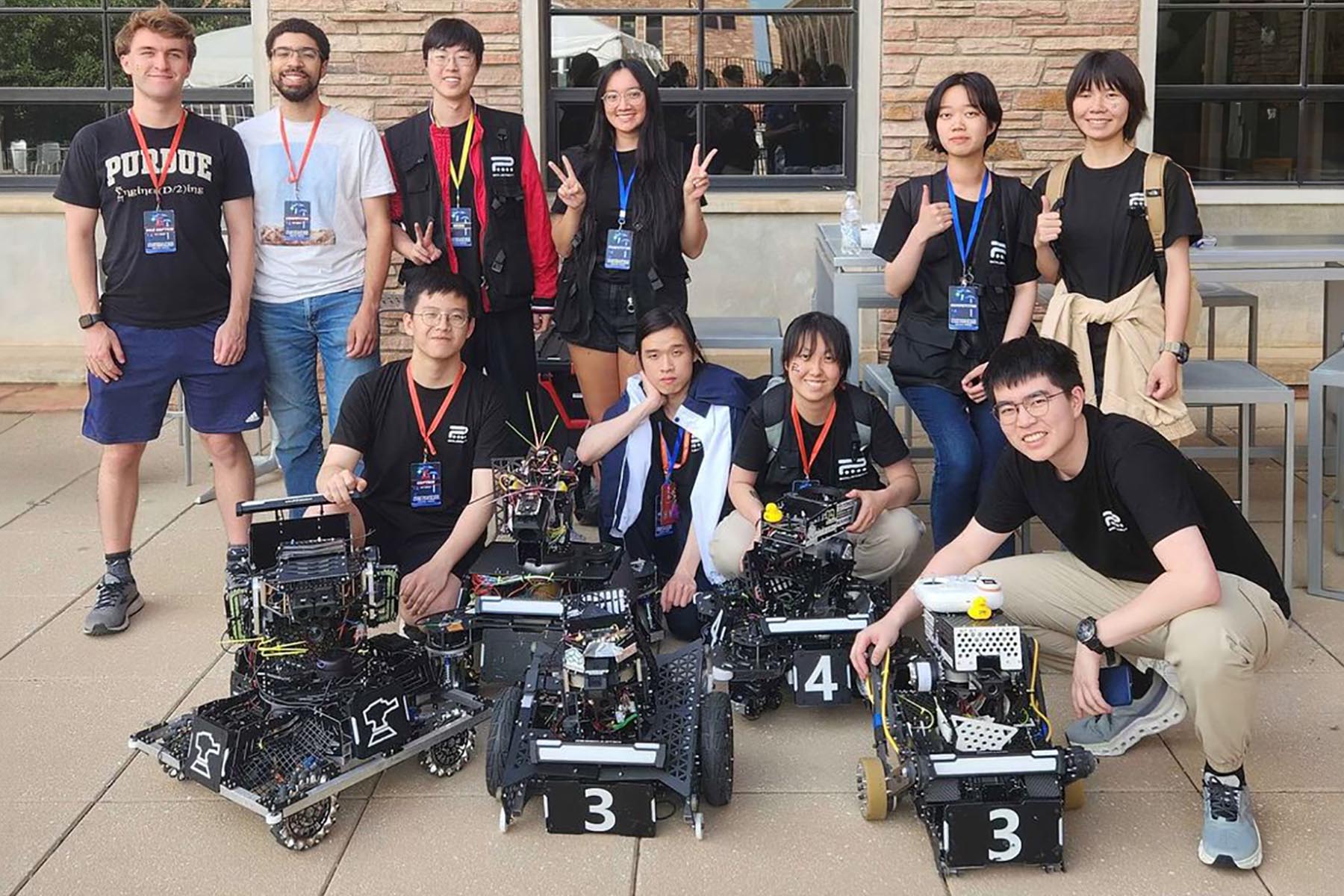RoboMaster: video games brought to life
Imagine a first-person shooter video game, but brought to life in an actual arena with projectile-firing robots built by students. That’s the idea behind RoboMaster, an international collegiate robotics competition where Purdue’s BoilerBot team is giving deserving nerds their moment in the spotlight.
“It’s just like e-sports,” said Megan Earp, a junior in electrical engineering and the outreach lead for BoilerBot. “There’s a red robot and a blue robot in an arena with obstacles, and each robot shoots little plastic projectiles, aiming for armored plates on the opposing robot. Once their hit points are out, that robot ‘dies’ and the shooter wins.”
The similarities don’t stop there. Most pilots control their robots through a laptop interface that looks exactly like a video game, right down to the live first-person camera view and the killscreen at the end. The only difference in the real world is the incessant racket of plastic pellets ricocheting off the walls and protective netting.
“It’s a lot of fun to watch,” Earp said, “and a lot of fun to participate in!”

It takes a village
Bringing this video game to life takes a lot more than just a Steam subscription. Each robot is custom-built by dozens of students over the course of a year.
“I myself am an electrical engineer,” Earp said, “but we also have a mechanical team, and other subteams. We have a business team, which is super important, and many other logistical roles. We need all types of students to succeed: technology, accounting, graphic design majors, and anything else you can focus on.”
“I’m part of the mechanical team,” said Jayson Stansbury, a mechanical engineering student. “We focus on the design, manufacture, and assembly of all the robots. I’ve also been working on data management, so we can share our CAD models and have robust version control across the team.”
Another vital role is adhering to the rulebook; these may be plastic pellets, but safety and fairness are still vital to the competition. “The basic dimensions are regulated to be no more than 600 by 600 by 500 millimeters,” said Ruoyi Li, mechanical lead for the team. “Outside of that, we can do pretty much anything we want. But we won’t build anything too crazy — our final goal is to win the game!”
Beyond the robustness of the robots, there are also several strategies on the playfield. A four-wheeled robot is required to have four hit plates, but they don’t have to remain static. So teams will rotate the base of their robot like a whirling dervish — giving their opponents a more difficult moving target — while keeping their own shooting head stationery to better aim their own projectiles.
At least that’s the theory. In practice, sometimes the whirling prevents the robot from moving reliably around obstacles. Or the central shooter malfunctions, leaving the robot a sitting duck for the opponent. Or the camera or radio signals are disrupted, disqualifying the robot from competing. So frantic engineers are always making repairs during a competition.
“I’m a results-driven person,” jokes Li. “I spent months of my life building this robot, I want to see it win. Every competition is a chance for improvement.”

Best of the best
In order to be the best, you have beat the best. And when it comes to RoboMaster, that’s impossible to do over Zoom — you have to meet up in person. So in March 2024, Purdue hosted a Midwest Invitational for teams to test their robots out in a friendly tune-up competition, welcoming students from Illinois, Penn State, Rose-Hulman, Virginia Tech and Washington University in St. Louis.
“We’re the only university in the country that hosts something like this,” Earp said. “We all get the chance to work out the kinks from our robots. The teams give presentations on their robots, offering tips and tricks, and showing what they are most proud of. It’s really nice to meet other students who are on the same journey as we are!”

Of course, a 1v1 robot competition in a meeting room is one thing. RoboMaster North America steps up the intensity by organizing an annual 3v3 competition to crown the North American champion.
“At our event, we compete with what are called ‘standard’ robots, shooting 17-millimeter projectiles,” Stansbury said. “In the 3v3 competitions, they add two more classes of robot: the ‘hero,’ which shoots much larger 42-millimeter projectiles; and the ‘sentry,’ which operates completely autonomously. Those contests can get pretty hectic!”
This year’s North American competition took place in Boulder, Colorado in June 2024, where Purdue BoilerBot finished 5th out of 26 teams. “This is an impressive result,” Earp said, “but more importantly we all had fun and shared some great memories. We achieved large technical advances in all areas of development and operations, thanks to the support of our sponsors and our amazing team members. We can’t wait for the thrilling season ahead!”
Beyond North America, Purdue has aspirations to travel to Shanghai for the international finals (RoboMaster was created by the Chinese drone manufacturer DJI in 2015.) Those competitions are even more spectacular — matching seven robots on each side, and taking place in a giant arena with a live audience of thousands and a television audience of millions.
“I think RoboMaster is the best arena for the best engineers,” said Jia Xie, a mechanical engineering student who serves as controls lead for BoilerBot. “It’s a complex project that not only requires multidisciplinary engineering skills, but great communication and professional practice skills. I love it when all these people are working together towards a single goal.”

Source: Purdue RoboMaster, https://purdueRM.org
Writer: Jared Pike, jaredpike@purdue.edu, 765-496-0374
